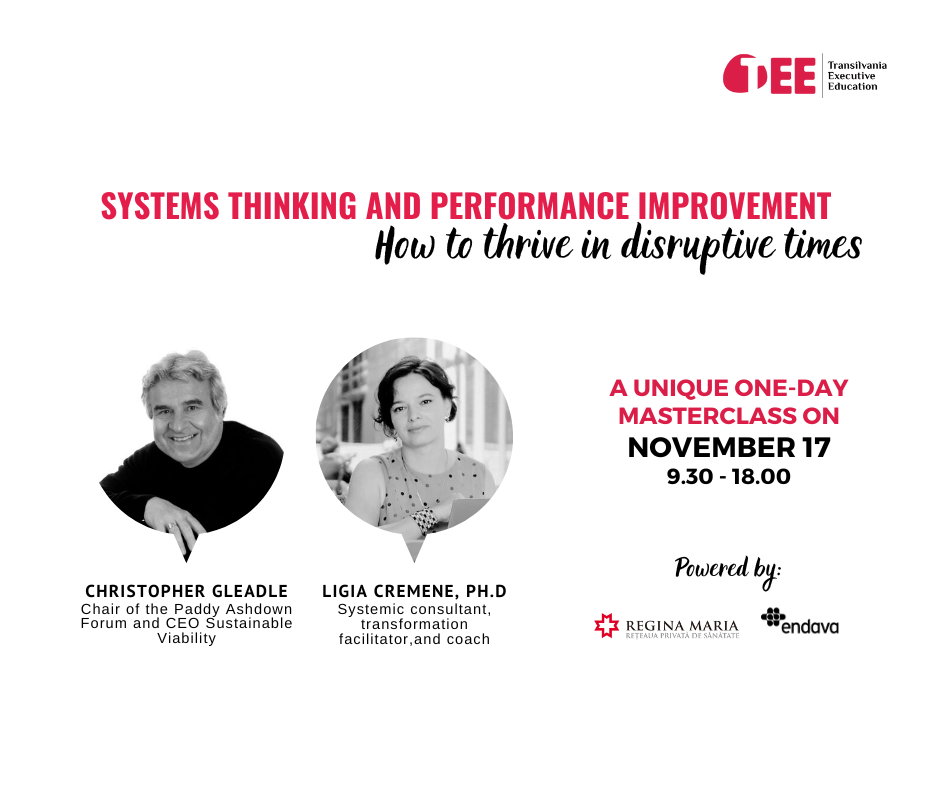
Introduction
In a rapidly changing world where businesses are increasingly focused on sustainability and success, it's essential to understand the concept of systems thinking. But what is systems thinking, and how can it benefit organisations?
In this interview, Christopher Gleadle, a systems thinking expert with over thirty years of experience, simplifies this complex idea for us. He explains the Sphere Economy model, its practical applications, and why it's crucial for achieving sustainable success.
Let's dive into this conversation to uncover how systems thinking can make a real difference in the way we operate and thrive in today's challenging environment. Christopher will come to Cluj for a unique one-day masterclass on November 17.
TEE: How would you define systems thinking?
Christopher: Systems thinking is a multifaceted endeavour. It evolves and adapts according to circumstance and according to how attuned organisations are as to what is required. Aspects of systems thinking will require processes to support them. Over time individuals and their organisations get quicker and more confident using our practiced techniques. Some techniques will become established habits. But its more than developing an instinct. The rigour of working through the Sphere Economy is working through an integrated design process that many will find comfortable to capture all of the dimensions of good sustainable viability. There is an art to the Sphere Economy. But it’s one you have to work at. You have to practise.
TEE: Where should we start implementing the Sphere Economy model?
Christopher: The Sphere Economy offers you a range of starting points. Perhaps pick one aspect how you organise functions and you could start there. It might be a production unit, or distribution. It might be how you communicate with your colleagues or how you interact with clients. Or perhaps there is one important moment on the horizon – a major product or service launch, and you could use that as a test to try sustainable viability. And, just whenever we learn something new, each time it’ll become more familiar and, each time it’ll be more effective too.
TEE: Why should organisations use the Sphere Economy model?
Christopher: There is a thrill to doing sustainable viability well. In part from a sense of achievement in taming complexities, of finding a way to handle and shape interdependence in unpredictable environments. In part, it is the sheer joy of knowing this is what you want to achieve in the best manner. And this is how to do it. But if there’s a thrill – there’s a shock too in understanding how much of what we do currently undermines what we’re hoping to achieve. Once you see and feel that, it’s very hard to forget.
TEE: How can systems thinking raise the performance of an organisation?
Christopher: All our lives are shaped, in part, by information that we share, seek, or receive. They’re shaped too by our interactions with colleagues, community, friends, or many others. Our thinking and action affects all of that. Systems Thinking can improve our lives and the lives of others. Time and energy goes to waste when interactions of the whole are not clearly explained. Systems thinking can help us understand, act, and communicate on subjects that feel overwhelming. It can help us act with confidence and clarity in fluid and intimidating circumstances. It can bring us success and transformative change. Once you start doing it, there is no going back.
Conclusion:
Christopher Gleadle's extensive experience and passion for systems thinking highlight its importance in the pursuit of sustainable viability. The Sphere Economy model, with its integrated design process, offers organisations a pathway to tackle the multifaceted challenges of today's world. As we conclude this interview, we extend an invitation to join Christopher at the Masterclass on Systemic Thinking and Performance Improvement on November 17th.
Christopher Gleadle has practised, mentored, and taught practical systems thinking for over thirty years. His prolific work is based on his experience implementing systems thinking across sectors sizes and boundaries.
Embracing systems thinking is not merely an option; it's a transformative journey that once started, has no turning back, ultimately leading to a more sustainable and viable future.


